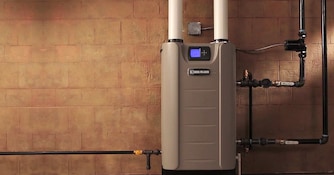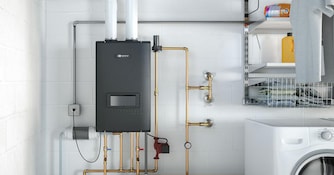
Which Boiler Fuel Should I Use?
In many homes around the world, a boiler is essential. A boiler can provide heat and even hot water to your home, that is, if you have a "combi" (short for combination) boiler.
Highly efficient boilers will save you money on your bills, but to go beyond basic efficiency, it's also important to understand the different options available to you and what they mean for your application, environment, and budget.
How Does a Boiler Work?
- First, the boiler burns fuel to heat water.
- Next, the heated water (or steam, if a steam boiler is used) distributes the heat through the house via pipes and radiators.
- The efficiency of a boiler is measured as AFUE (annual fuel utilization efficiency), which is the ratio of annual heat output of the boiler compared to the total annual fuel energy consumed by the boiler.
- If the AFUE is 90 percent, then 90 percent of the heat created by burning the fuel is used for heating your home while the other 10 percent escapes - thus, having a higher AFUE means that you need less fuel to heat your home, saving you money instantly (see our previous article on energy efficiency acronyms for more info). When looking for a new high efficiency boiler, you will want to look for one with at least 90% AFUE, although anything above 80% is no less than standard.
Below we have compared each type of boiler fuel: natural gas, propane, oil, and electricity, so you can see what fuel choice is right for you.
Natural Gas
Geography: Depends on proximity to pipeline, but usually readily available.
Price: On average, the least expensive fuel (depending on proximity to pipeline).
Effect on Environment: Cleaner than oil, low amounts of greenhouse gases.
Energy Value: 850-1,050k BTU/ft. 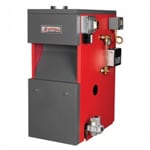 Natural gas boilers are the most common boiler type in North America and is the most common fuel primarily because it is relatively inexpensive. It can be piped directly into the home, depending on the geographic region and whether the area has a natural gas distribution system.
Natural gas boilers are the most common boiler type in North America and is the most common fuel primarily because it is relatively inexpensive. It can be piped directly into the home, depending on the geographic region and whether the area has a natural gas distribution system.
Areas at the end of the pipeline, such as the Northeast, usually have higher prices for natural gas since the gas has to be transported by a truck while in a liquid state. Gas-fired boiler emissions contain low values of carbon and high values of hydrogen.
The combustion of natural gas results in a low amount of greenhouse gas emission and is found to be a clean fuel in comparison to oil. In general, having a high efficiency gas boiler means you have a unit with fuel that is readily available, burns cleanly, and is usually less expensive than oil or electricity.
Liquid Propane
Geography: Widely available
Price: Typically costs more than natural gas, but still relatively inexpensive
Effect on Environment: Cleaner than oil, not a greenhouse gas
Energy Value: 91k BTU/gallon 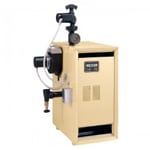 Liquid propane is commonly used as boiler fuel where the availability of natural gas is either very limited or expensive. It is very common in rural areas of the United States.
Liquid propane is commonly used as boiler fuel where the availability of natural gas is either very limited or expensive. It is very common in rural areas of the United States.
Propane is similar to natural gas in that it is simple and economic, however, since it's a liquid, the energy content of propane is measured in gallons instead of cubic feet. It is generally carried and delivered to the usage point with the help of pressurized gas containers.
Although propane is not a very sustainable form of fuel, it is a fairly clean fuel - it produces fewer emissions than other carbon energy sources including oil and gasoline, and it is not considered a greenhouse gas. Many gas-fired boilers can accept either natural gas or liquid propane as fuel by using an appropriate conversion kit.
Oil
Geographic: Needs to be transported
Prices: Often more expensive than gas or propane, cheaper than electricity
Effect on Environment: Cleaner than burning wood or coal, more CO2 than natural gas Energy Value: 139k BTU/gallon 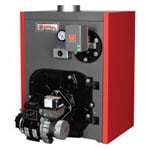 Oil-fired boilers were once very common but have mostly been replaced by natural gas and propane since those fuels are cheaper and more efficient.
Oil-fired boilers were once very common but have mostly been replaced by natural gas and propane since those fuels are cheaper and more efficient.
Oil-fired boilers usually burn fuel oil which has to be delivered by truck, and the costs of transporting oil are not cheap. However, high efficiency oil boilers are a popular choice in areas of the country that have limited access to natural gas. Burning oil is a clean and ash-free combustion process.
Oil fuel emissions usually consist of more carbon content than natural gas, but less carbon content than solid fuels such as coal, which means there is less emission of carbon dioxide.
Electric
Geographic: Widely available
Prices: Usually very expensive
Effect on Environment: Depends on source of electricity
Energy Value: 3,412 BTU/kwh 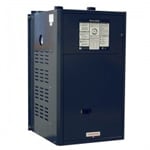 Electric boilers use resistance (or immersion) type heating elements.
Electric boilers use resistance (or immersion) type heating elements.
Electric boilers are popular for being clean, quiet, compact, easy to install and easy to replace. These types of boilers can be used as good alternatives for customers who are restricted by emissions regulations.
They are the most expensive form of boiler fuel, but they are also the most efficient. These systems are very useful if there is not a gas or oil supply nearby. Electric boilers do not utilize a fire box, and are therefore safer than oil and gas boilers. Electric boilers are considered cleaner than gas or oil-fired boilers because there is less condensation and fewer contaminants.
Boilers, like any other product, can make a significant impact on your energy footprint - whether or not that footprint is small or large is up to you.


